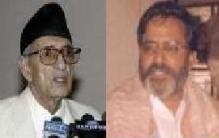 The surge in popular protests against King Gyanendra’s regime has set off a race to take credit.
The surge in popular protests against King Gyanendra’s regime has set off a race to take credit.Nepali Congress President Girija Prasad Koirala, the supreme commander of “People Power II”, continues to insist the movement is being led and controlled by the Seven-Party Alliance (SPA).
His principal lieutenants seem to be in full agreement; some have made identical pronouncements, while others have offered silence as evidence of support.
In an interview with BBC Nepali Service, Maoist spokesman Krishna Bahadur Mahara was baffled by the way the SPA leaders refuse to acknowledge the protests as part of the 12-point understanding. He went a step further and claimed that the signatories had in fact agreed to end the monarchy.
Koirala, in his interview with the BBC, insisted he held talks with the Maoists as well as with the international community based on some basic principles: the end of autocratic rule, peace, full-fledged democracy and independent, sovereign and prosperous Nepal. “Go and ask the Maoists,” Koirala challenged the interviewer, “I have held dialogue with them within the parameters of these principles.”
The only people who can offer independent verifications are Ambassadors Moriarty, Bloomfield and Mukherjee. But they too busy watching and waiting. (No wonder critics and supporters of the 12-point deal were united in demanding greater transparency on the Delhi agreement.)
With the “urban uprising” part of Prachanda Path’s strategic offensive phase in full motion, the stakes are too high. So Mahara’s boss, Dr. Baburam Bhattarai jumped in to tackle the joint ownership issue in a different way.
The SPA and the Maoists are the only constitutional forces, he said in Jana Astha weekly (although a little later he contradicts himself by saying there can be no constitutional forces when the constitution itself is inactive.)
But you get the drift. The chief Maoist ideologue is bothered by the way the term is being thrown around by the international community of democracies in pushing national reconciliation. Mahara and Dr. Bhattarai are being puerile. Of course, the SPA would vigorously deny joint action with the Maoists. That’s precisely the royal regime’s justification for the harsh crackdown.
So who’s riding whom? “Ground realities” – that favorite Maoist term – seem to support Mahara’s contention. The rebel offensive at Malangawa, Butwal and Kapilvastu may not have energized the pro-democracy activists in Kathmandu and other centers in way Mahara claims. They sure pinned down the security forces.
Then both Maoist leaders slip. “The peaceful agitation alone can’t bring about the end of monarchy,” Mahara argued. Dr. Bhattarai exuded more erudition: "A weak capitalist class cannot alone lead a capitalist popular revolution".
Koirala, on the other hand, sounds confident. Asked whether he would hold talks with King Gyanendra, he said he wouldn’t go to the palace with his tail behind his feet.
In any case, when the Maoists are willing to share something, things must be messier on their side.